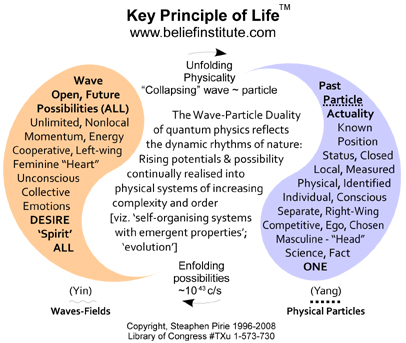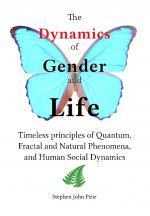Posted 30 Nov. 2008, 10:51pm, by Stephen Pirie
Both are "wrong" (within the context of the general understanding, analysis and discussions). Within a broader, deeper holodynamic-systems context (as covered by the Key Principles of Life, for Life) both are "right" in that the system we experience is newly forming and being formed by intelligent interaction with the physical environment.
Lamarck was ahead of his time: We physically affect our genetic structure (and children's inherited characteristics) by what we think, feel and believe - as required by the Key Principles.
 According to some estimates, our physical system is rapidly being refreshed somewhere around 18.54 x 1042 times each second (the inverse of the Planck time). In other words, the universe, and everyone and everything in it, is newly cycling into physicality trillions of times each second. It is being intelligently designed by us and the greater unconscious-collective within which we exist. That is to say, "it" -- the system, comprising our bodies, planet and the entire universe -- is being "intelligently designed, and re-designed" many trillions of times each second. And each part within is co-creating the system as experienced. As physicist John A. Wheeler remarked, we live within a participatory universe.
According to some estimates, our physical system is rapidly being refreshed somewhere around 18.54 x 1042 times each second (the inverse of the Planck time). In other words, the universe, and everyone and everything in it, is newly cycling into physicality trillions of times each second. It is being intelligently designed by us and the greater unconscious-collective within which we exist. That is to say, "it" -- the system, comprising our bodies, planet and the entire universe -- is being "intelligently designed, and re-designed" many trillions of times each second. And each part within is co-creating the system as experienced. As physicist John A. Wheeler remarked, we live within a participatory universe.
As introduced elsewhere on this site, science and religion are "sister belief-systems", in that both objectify physical and meta-physical realities, respectively. Both rely on, and posit theories based on an objective separation of perceiver from some 'functionally separate' aspect of existence (physical and meta-physical). Scientific and religious beliefs are reliant on a fundamental disconnect between individual (part) and whole (universe); between individual-consciousness and collectives of unconscious/nonlocal cooperation and influences; between One and All.
As the PEAR laboratory's press release emphasises, explaining its closure after having completed its mission:
"The enormous databases produced by PEAR provide clear evidence that human thought and emotion can produce measureable influences on physical reality. The researchers have also developed several theoretical models that attempt to accommodate the empirical results, which cannot be explained by any currently recognized scientific model."1
As physicist David Bohm explained (with the proof of nonlocality), we can expect that
As we should expect, the appearance and assumption of continuity (upon which standard solutions to Zeno's Paradoxes are dependent) will lead to various transition fossils being uncovered (up to a point3) that will tend to support Darwinian theories.
However, as within the micro-world of quantum physics, no number of intermediate fossils will provide an explanation for the impetus towards evolutionary development of more complex biological systems. That is, no scientific theories have yet identified how infinite possibilities (for mutations) are congealed into beneficial evolutionary developments; or how self-organising systems grow towards more complexity; or how quantum wave-functions of particles (imbued with infinite possibilities) meaningfully and repeatedly collapse to form beneficial coordinated systems of order – our everyday relatively-stable world of cars, cats and computers.
Similarly, religious deference to some objectified spiritual agent ('God') does not provide a credible basis for evolution, or for our ability to control our (evolutionary) destiny.
Science and religion equally defer our power to control our destiny to independent external forces and agents (random mutations and God, respectively).
See also
- Key Principles
- Applying Key Principles
- is there a higher-power guiding me?
- Good systems thinking (stephenpirie.com website)
- 1. PEAR press-statement"
- 2. David Bohm, Wholeness and the Implicate Order, Routledge, London 1995, page 174
- 3. All of which will not deliver the "mechanism" for evolution or change, due to inherent limitations as defined by Gödel's Incompleteness Theorem, Heisenberg's Uncertainty Principle and as we can deduce from straightforward analysis.
 "The Dynamics of Gender and Life" ebook is now available at
"The Dynamics of Gender and Life" ebook is now available at